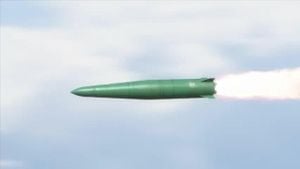Over the past few weeks, the political firestorm surrounding Israeli Prime Minister Benjamin Netanyahu escalated dramatically following the issuance of arrest warrants by the International Criminal Court (ICC). The warrants, which include charges of crimes against humanity, have ignited intense discourse across the globe, causing governments to weigh their obligations to international law against geopolitical alliances.
The ICC's arrest warrants were issued not only against Netanyahu but also against Yoav Gallant, the former defense minister of Israel. These accusations stem from actions taken during the recent Israel-Hamas war, which erupted on October 7, 2023, leading to significant loss of life and widespread devastation.
Canadian Prime Minister Justin Trudeau was among the first leaders to respond formally. Trudeau reaffirmed Canada's commitment to international law, asserting, “We will abide by the ruling,” linking it to the values Canadians hold dear. His comments came shortly after the United Kingdom’s Prime Minister, Keir Starmer, stated the UK’s legal obligations as they pertain to ICC rulings.
The situation escalated as Starmer’s spokesperson hinted at potential legal actions without confirming whether police would take steps to detain Netanyahu should he step foot on British soil. “I can’t get too much involved with hypotheticals relating to individual cases,” was the cautious line offered to reporters.
Meanwhile, across the Atlantic, U.S. reactions have been markedly different. President Joe Biden deemed the ICC's warrants as “outrageous,” positioning the United States firmly on Israel's side. The Biden administration’s response has sparked debates within the U.S., especially from figures like Senator Bernie Sanders, who criticized the administration's stance, asserting, "If the world does not uphold international law, we will descend to barbarism.”
Sanders' comments reflect dissatisfaction with the growing divide between global adherence to human rights laws and the actions of powerful nations. Countries such as Belgium, France, and Turkey have expressed support for the ICC’s decisions, emphasizing the importance of accountability for alleged war crimes. Conversely, nations like Argentina and Hungary diverged from this consensus, highlighting the fractious nature of international law adherence.
Adding another layer to the diplomatic tension, U.S. Senator Lindsey Graham urged the UK against actions supporting the ICC arrest warrant. He warned Prime Minister Starmer; the U.S. could retaliate economically against any nation viewing the ICC’s arrest warrant favorably. Graham articulated, “Any nation or organization aiding this outrage should expect firm resistance from the United States.” Such threats have stirred concerns about the future of U.S.-UK relations, historically marked by collaboration and shared interests.
The discussions surrounding these warrants come at a delicate time, as the geopolitical backdrop is fraught with uncertainties following the staggering human toll of the war between Israel and Hamas. The war has resulted not just in casualties but has exacerbated existing humanitarian crises within Gaza, raising urgent discussions around human rights and international diplomatic obligations.
Public opinion has also begun to reflect these complex dynamics. Across various social media platforms, discussions abound about the accountability of leaders who prioritize political security over adhering to humanitarian norms and international laws. Figures like Sanders have resounded with those calling for justice, reiteratively stressing the world must hold the powerful accountable to prevent future atrocities.
Going forward, the international community remains watchful. Not only are the political ramifications of the ICC’s warrants under scrutiny, but there is growing concern over how these events will affect humanitarian efforts and diplomatic relations moving forward. With major global players like the U.S. and Canada taking firm stances, the world is bracing itself for potentially significant shifts in the geopolitical climate, as countries negotiate the tightrope walk between their national interests and international justice.
Despite the growing tensions, hope persists among activists and global leaders alike advocating for adherence to international law. The ICC's role could serve as a precursor to reformative discussions on how nations navigate their obligations post-conflict and the necessity of transparent, fair trials for those accused of war crimes.
The handling of Netanyahu's situation poses questions not only about the practicalities of enforcing such warrants but about the very integrity and functionality of international law itself. The coming weeks will likely bring additional developments as this complex issue plays out on the world stage.
With continued cross-border tensions and international engagements shifting amid these legal pursuits, the prospect of justice could potentially reshape the narratives around global leadership and accountability.



